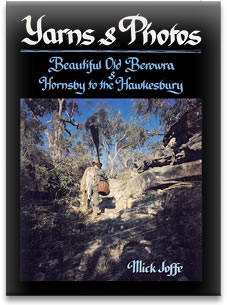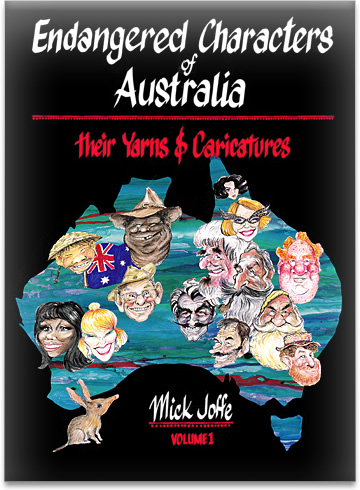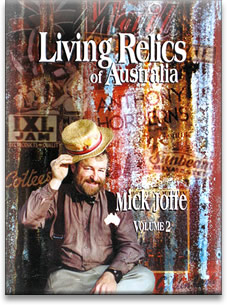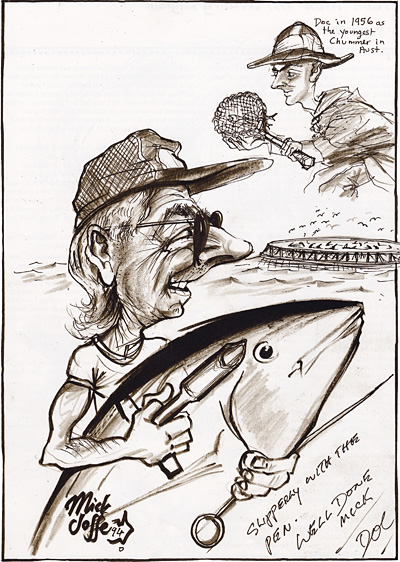 Yarns & Photos
We have found in storage the last few boxes of the original 1992 print. This book has not been re-released. These won't last long!
$149 + Postage
Buy Now
Yarns & Photos
We have found in storage the last few boxes of the original 1992 print. This book has not been re-released. These won't last long!
$149 + Postage
Buy Now
 Endandgered Characters of Australia
We have found in storage the last few boxes of the original 1995 print. This book has not been re-released. These won't last long!
$149 + Postage
Buy Now
Endandgered Characters of Australia
We have found in storage the last few boxes of the original 1995 print. This book has not been re-released. These won't last long!
$149 + Postage
Buy Now
 Living Relics of Australia
Living relics contains 25 of our greatest living characters. This coffee table hard-cover book combines the very Australian art of caricature with oral history - the history of drovers, shearers, naturalists, miners, artists, explorers, etc. Their caricature captures them on the outside and their own words capture them on the inside.
Only $29 + Postage
Buy Now
Living Relics of Australia
Living relics contains 25 of our greatest living characters. This coffee table hard-cover book combines the very Australian art of caricature with oral history - the history of drovers, shearers, naturalists, miners, artists, explorers, etc. Their caricature captures them on the outside and their own words capture them on the inside.
Only $29 + Postage
Buy Now
Interviewed: 1994
Published online: Wednesday, 15 September 2010
This interview is from Endangered Characters of Australia.
Doc Howlett
1940s
Pioneer tuna fisho of Port Lincoln
My ol’ man reckoned I caught my first fish at 2 years old but I don’t believe him. Before my ol’ man let me take a boat out he made me swim the full length of Ceduna wharf. He walked up top, makin’ sure I didn’t grab a pile for a rest. I used to row a boat to school and anchor my dinghy off the school, fishing to and from. Used to get in some fearful shit from the teachers. On Monday mornings we’d all ask around the classroom - 10 dozen, 15 dozen fish, braggin’ in front of the teacher who often didn’t catch that many. As a kid I was making more money sellin’ me fish than he was makin’ as a teacher. Once he hit me across the arse with a wicket so hard I went straight through an asbestos wall with my head. Anyway I excelled in the 3R’s - rowing, rigs and reefs.
Everyone in our class failed that year and failed brilliantly. Everyone from that class went their own way and did very well so you don’t have to pass exams. I just naturally progressed to professional fishing when I left school.
About ‘52 or ‘54 Alf Dean had this huge shark, at Ceduna, one of his records, one of the 6 over the ton that Alf Dean caught. He went up the pub to celebrate and us kids got stuck into the teeth in the jaw with our knives. They camb down hootin’ and yellin’ and screamin’ They had us trapped on the wharf so we swam away. We half lived in the water.
At 16 I got a job on a tuna boat. No one knew how to catch the tuna so the South Australian Government brought out 2 Norwegian-Americans, the Jangaard brothers to teach 2 boats from Port Lincoln the poling method for tuna. It kicked off from there and turned into a very successful industry. I joined a boat in Eden, NSW in 1959 - the ‘Estelle Star’, a converted ferry. Ken Tidswell, the skipper, had the flair and ability to prove you could make a full time tuna living.
I got my own boat, ‘Cape Baron’, and went into prawn trawling in 1967. There had been dibble dabbling but not in commercial quantities. I’ve got 2 letters from the Fisheries accrediting me with pioneering the prawn fishery in South Australia.
In 1960 I was unloading tuna off the Estelle Star and I noticed a 12 foot white pointer swimming around the pier. I threw a hook in on a lump of rope and brought him alongside and shot him with a 303 and winched him straight up.
How I got my nickname Doc: when working, we were always playing cards and they reckoned I was like Doc Holiday. We were tuna fishing once and a bloke got hit in the cheek with a hook and laid it open. I said, “I’ll stitch it up.” “All right.” I got a needle and cotton dipped in Dettol and stitched it up. He could stand a bit of pain. After that me nickname really stuck.
My first boat, the ‘Aloma’, had no reverse - tiller steering, no navigational lights, no radar, no wireless, no echo sounder. I took it from here [Port Lincoln] to Ceduna. A 24 gallon drum for water and a 24 gallon for fuel and a 10 gallon cream can on deck - that wds the spare fuel tank. We just steamed by the stars. We’d shine a torch on a compass which was nailed into place, then look for a star above it as a bearing. If I could see white water at night I was too close to the shore or a reef. Our hats were slouch hats or caps with layers of paint to make ‘em waterproof. Unable to buy a parallel ruler I cut a length from a deck broom handle and rolled it across the chart when plotting my course. Our coats were wharfies’ raincoats - a wheatbag with the corner turned in.
Old Billy Warren of Eden was a character. We were comin’ in from tuna fishing. We always had troll lines on. Billy said, “How rough was it?” I said, “It was that rough, I was gonna play a trick on you. I was gonna tie some seaweed on the mast to show you a big wave washed it there.” “Did you?” “Yeah, but the next wave washed it off.” Billy was amazed.
One bloke, Rupert Meagher, put some goper scales in his wallet as big as 2 bob pieces and showed ‘em to old Billy in Eden Fishing Club to show him how big the salmon are in South Australia. Old Billy couldn’t get over that. One bloke said, “The mutton birds are so thick I couldn’t see Australia to make the shot.”
One day we were steamin’ along and a patch of tuna came up between us and a competitor’s boat. The sea was as flat as a shitcarter’s hat. I was spottin’ in the crows-nest. I got the boys all wavin’ like mad at him in the bow and while he took it all in, he steamed straight past the tuna... useful as a wooden leg in a bushfire. We swung in onto the patch and poled 15 ton. That was Gavin Scott on the ‘Mameena’. That’ll give him a laugh... or maybe it won’t.
While I was fishing here, over a period of 3 years, 17 men were drowned - tuna fishermen; 14 of them off 2 boats that sunk. It was a hairy game. When ya come ashore, monumental piss ups. Played up hard; all young, single and cashed up. What more ingredients do ya need?
For 25 years I travelled inland Australia, shunning towns, real Outback. The characters were really good pioneer stock, battling all their life. But the new generation have gone to cities; better educated; too big a gap. There was no taper off; it just seemed to stop. It’s good you’re doing this, Mick, getting the scraps that are left. It’s getting to be a scrap age.
In my travels we came up to ol’ Colly again. It had been 2 years. “Oh you bastards again!” He was building a turkey nest dam. They’d killed a beast, threw some rib bones in the mulga wood ash and pulled ‘em out and gnawed on ‘em. I brought out this frozen block of fish. He chucked it in an old red tin in the truck. The truck was full of gaps, a huge ding in the top; 5 million flies would have poured in each end. Coming back, we asked, “How was it?” “Oh, we ate so much of it we got crook in our guts. Stick ya fish in yer arse!”
This prawn fishery in Spencer Gulf is recognised world-wide as a benchmark for fisheries management done through cohesion through industry, meaning the fishermen themselves and the South Australian Fisheries Department. We are very fortunate in this case with one or two key understanding men on both sides. It is fantastic.
I’ve sold the Cape Baron to Bob Britcher and now I’m back to tuna farming. See, I’m only going to live to 100 and I’ve gotta jam as much in as possible. I was in the prawn fishing for 20 years.
One day in 1966 off Ceduna, in Fowlers Bay, on the Cape Baron, we had 6 ½ thousand pounds of crayfish on board and we couldn’t hold any more in the holding tank. So half way through pulling pots we had to stop fishing, left the pots down and went home. We were as busy that day as a cat burying shit on a marble floor. I know of no one else in these waters that has experienced that.
When I was doing tuna surveys, on off days I used to go out whaling with the whalers from Cheynes Beach Whaling Station at Albany. I left there in ‘64. There were more characters then than you could point a harpoon at. Ches Stubbs, he cut his leg off with a rope. He was a skipper and gunner. A volatile man. The bloke up the crows-nest would say, “Five lengths ahead” and so on. Every time he missed a whale he’d throw his beanie on deck and lose it.
This day the whale came one side of the boat. The whale switched sides and he swung the gun round and fired and stepped into a coil of rope and it chopped his leg off at the shin and it flew over the side. The whale spotter plane put down alongside the chaser, which was an incredible feat as it was not a sea plane. They rowed the skipper over in a rubber raft. The cook swam alongside to push the raft faster. Got him on the plane. Two other chasers steamed flat out into the wind alongside him, three parallel to flatten the sea, to make it calm enough for the spotter plane to take off ‘cause it wasn’t a sea plane. Had him in hospital in 2 ½ hours and he was back shootin’ whales in 6 weeks with a new leg. The pilot John Bell got a decoration for his feat.
Axel Christiensen was another skipper / gunner; liked a drink. The first mate would take the boat out. The skipper had books balanced on his cabin shelf that would fall off when they cleared Bald Head, the entrance to King George Sound if it was too rough, and he’d call through the voice pipe to the wheelhouse, “Turn around.” He was a character.
I’ve seen the Humpbacks on the east coast and the Rights in the Great Australian Bight shot down to nothing. They may be comin’ back. The Albany Station was well managed as far as doin’ the right thing by the whale... no undersize, no females. There was more control on a station than out to sea. Despite political claims using the Green movement for votes, it was basically economics that closed it down... substitutes and synthetics. It’s a good thing it shut and it’s great to see the whales coming back. They were so innocent and inoffensive.
I don’t write conftracts; my word’s my bond. If I say I’ll do a thing - barring sickness, I’ll do it. I love the sea; you can’t get a better life than on the sea. I like workin’ for young fellas and showin’ ‘em things - splicing rope knots and rigs. They come out, they’re green. They think it’s brilliant and I’m getting this rejuvenation.
Bernhardt Otto Holterman
Born in Germany, 1834... He discovered a huge rich gold claim at Hill End, NSW. Later finding a gold nugget worth 12,000 pounds, he then spent 5,000 pounds obtaining a famous photographic collection of the goldfields.I’ve always reckoned travelling is the best education you can get. The basic things, a good fire, good company and peace and quiet and maybe the odd drink to make the fire seem brighter. I reckon I’m fortunate ‘cause I reckon I was born at the right time for what I was doin’. Everything was new and there were no restrictions. You could fish for everything. You survived by your skills; you had to. No one assisted. Banks didn’t want to know you. We were not the dregs but we were low down. This is the ‘40s and ‘50s. This whole town survived on fishing. Now we got bugger-all secondary industries here and the farming is low key as all over the country.
The Japs got us by the nuts in a sense. They know there’s 1,500 ton of tuna in this bay. We’re on a one market situation and we can’t comprehend their thinking at times but we have got something that they want.
There’s a lot of difference between being a fisherman and making it as a fisherman. That’s one of my originals; never heard anyone else use that. Some of the top fishermen worth remembering, that I respected are Ken Tidswell, Mike Buberis and Ben Simms, all still alive at this time but in the twilight. All pioneers in their own right. That’s dead true and you could get that from just about anyone round here who knows and understands the fishing industry here from the last 40 years.
Mick Joffe
More Characters
Since the early 1970s, Mick Joffe's passion has been to caricature and record endangered characters of Australia, and the world. As of 2015, the majority of these interviews exist only in manuscript form.
Click here to see the full list of interviews...
 Yarns & Photos
We have found in storage the last few boxes of the original 1992 print. This book has not been re-released. These won't last long!
$149 + Postage
Buy Now
Yarns & Photos
We have found in storage the last few boxes of the original 1992 print. This book has not been re-released. These won't last long!
$149 + Postage
Buy Now
 Endandgered Characters of Australia
We have found in storage the last few boxes of the original 1995 print. This book has not been re-released. These won't last long!
$149 + Postage
Buy Now
Endandgered Characters of Australia
We have found in storage the last few boxes of the original 1995 print. This book has not been re-released. These won't last long!
$149 + Postage
Buy Now
 Living Relics of Australia
Living relics contains 25 of our greatest living characters. This coffee table hard-cover book combines the very Australian art of caricature with oral history - the history of drovers, shearers, naturalists, miners, artists, explorers, etc. Their caricature captures them on the outside and their own words capture them on the inside.
Only $29 + Postage
Buy Now
Living Relics of Australia
Living relics contains 25 of our greatest living characters. This coffee table hard-cover book combines the very Australian art of caricature with oral history - the history of drovers, shearers, naturalists, miners, artists, explorers, etc. Their caricature captures them on the outside and their own words capture them on the inside.
Only $29 + Postage
Buy Now
 Caricature of Doc Howlett, by Mick Joffe
Caricature of Doc Howlett, by Mick Joffe
 Sir Mark OliphantReluctant Builder of the Atom Bomb
Sir Mark OliphantReluctant Builder of the Atom Bomb Milton Golby
Milton Golby Geoff MackCountry music singer and songwriter
Geoff MackCountry music singer and songwriter Ken DownesSnowy River Canoeing
Ken DownesSnowy River Canoeing H.R.H. Prince LeonardPrince of Hutt River Province
H.R.H. Prince LeonardPrince of Hutt River Province Gordon JohnstonA Pitt Town Local Legend and character
Gordon JohnstonA Pitt Town Local Legend and character